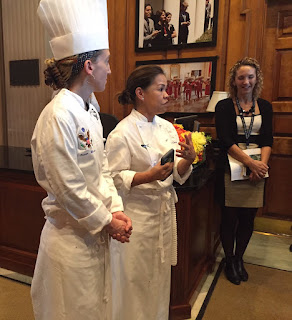When given an opportunity to network, UMD’s dietetic interns
jump at the chance. The interns recently
were able to connect with some previous interns during a tour at the White
House. The tour was coordinated by Sasha Bard, a former UMD Dietetic Intern who
currently serves as Associate Director of Policy for Michelle Obama’s Let’s Move program.
Although anyone can schedule their own self-guided tour of
the White House, the intern’s tour came with a couple of benefits. We met
members of Let’s Move who told us about
their daily duties and what it’s like to work in the Office of the First Lady.
We also met the White House Executive Chef and Pastry Chef. They described what
it is like to cook for the first family and official visitors. The chefs shared
some of the Obama’s favorite meals and other interesting facts about White
House food.
After hearing from the speakers, it was time to go on the
self-guided tour. The White House encourages visitors to take pictures and that
is exactly what the interns did. From group pictures with statues of former
Presidents to selfies outside the White House, the interns made sure to
document their tour. Overall, the White House was an incredible experience and
something that we are sure to remember. I am grateful we had this networking opportunity
and I gained insight into these RDs’ valuable work.
 |
| 2016-2017 Interns with bust of Abraham Lincoln. |
 |
| Group selfie outside the White House! |
|
|
|
|
|
|






